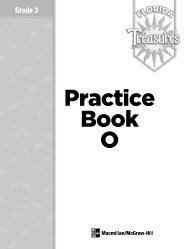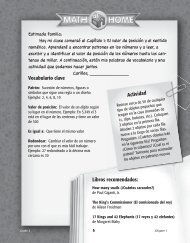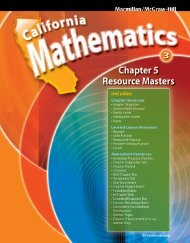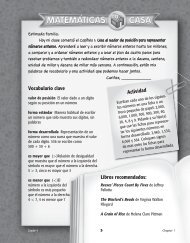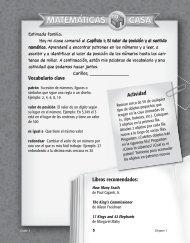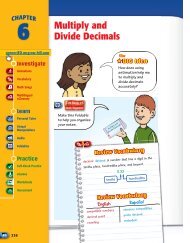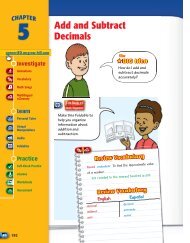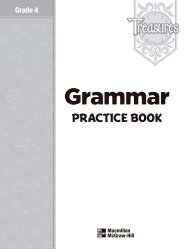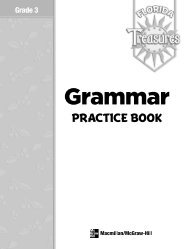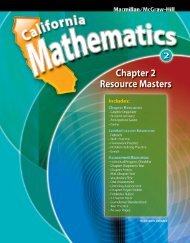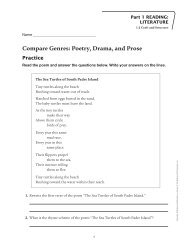- Page 1 and 2:
����� � �����
- Page 3 and 4:
© Macmillan/McGraw-Hill Unit 1 •
- Page 5 and 6:
© Macmillan/McGraw-Hill Unit 3 •
- Page 7 and 8:
© Macmillan/McGraw-Hill Unit 5 •
- Page 9 and 10:
© Macmillan/McGraw-Hill Name A. Se
- Page 11 and 12:
© Macmillan/McGraw-Hill Name As yo
- Page 13 and 14:
© Macmillan/McGraw-Hill Name Photo
- Page 15 and 16:
© Macmillan/McGraw-Hill Name The l
- Page 17 and 18:
© Macmillan/McGraw-Hill Name The p
- Page 19 and 20:
© Macmillan/McGraw-Hill Name As I
- Page 21 and 22:
© Macmillan/McGraw-Hill Name Somet
- Page 23 and 24:
© Macmillan/McGraw-Hill Name Pract
- Page 25 and 26:
© Macmillan/McGraw-Hill Name As yo
- Page 27 and 28:
© Macmillan/McGraw-Hill Name A lib
- Page 29 and 30:
© Macmillan/McGraw-Hill Name • T
- Page 31 and 32:
© Macmillan/McGraw-Hill Name When
- Page 33 and 34:
© Macmillan/McGraw-Hill Name As I
- Page 35 and 36:
© Macmillan/McGraw-Hill Name If yo
- Page 37 and 38:
© Macmillan/McGraw-Hill Name Choos
- Page 39 and 40:
© Macmillan/McGraw-Hill Name As yo
- Page 41 and 42:
© Macmillan/McGraw-Hill Name Chart
- Page 43 and 44:
© Macmillan/McGraw-Hill Name The l
- Page 45 and 46:
© Macmillan/McGraw-Hill Name A. Re
- Page 47 and 48:
© Macmillan/McGraw-Hill Name An in
- Page 49 and 50:
© Macmillan/McGraw-Hill Name As I
- Page 51 and 52:
© Macmillan/McGraw-Hill Name An id
- Page 53 and 54:
© Macmillan/McGraw-Hill Name A. Fr
- Page 55 and 56:
© Macmillan/McGraw-Hill Name As yo
- Page 57 and 58:
© Macmillan/McGraw-Hill Name Legen
- Page 59 and 60:
© Macmillan/McGraw-Hill Name Add t
- Page 61 and 62:
© Macmillan/McGraw-Hill Name The m
- Page 63 and 64:
© Macmillan/McGraw-Hill Name As I
- Page 65 and 66:
© Macmillan/McGraw-Hill Name You c
- Page 67 and 68:
© Macmillan/McGraw-Hill Name A. Fr
- Page 69 and 70:
© Macmillan/McGraw-Hill Name As yo
- Page 71 and 72:
© Macmillan/McGraw-Hill Name An al
- Page 73 and 74:
© Macmillan/McGraw-Hill Name • T
- Page 75 and 76:
© Macmillan/McGraw-Hill Name When
- Page 77 and 78:
© Macmillan/McGraw-Hill Name As I
- Page 79 and 80:
© Macmillan/McGraw-Hill Name An an
- Page 81 and 82:
© Macmillan/McGraw-Hill Name A. Re
- Page 83 and 84:
© Macmillan/McGraw-Hill Name Compl
- Page 85 and 86:
© Macmillan/McGraw-Hill Name As yo
- Page 87 and 88:
© Macmillan/McGraw-Hill Name Narra
- Page 89 and 90:
© Macmillan/McGraw-Hill Name The p
- Page 91 and 92:
© Macmillan/McGraw-Hill Name A fac
- Page 93 and 94:
© Macmillan/McGraw-Hill Name As I
- Page 95 and 96:
© Macmillan/McGraw-Hill Name Pract
- Page 97 and 98:
© Macmillan/McGraw-Hill Name A. Ch
- Page 99 and 100:
© Macmillan/McGraw-Hill Name Pract
- Page 101 and 102:
© Macmillan/McGraw-Hill Name Study
- Page 103 and 104:
© Macmillan/McGraw-Hill Name Pract
- Page 105 and 106:
© Macmillan/McGraw-Hill Name When
- Page 107 and 108:
© Macmillan/McGraw-Hill Name As I
- Page 109 and 110:
© Macmillan/McGraw-Hill Name The e
- Page 111 and 112:
© Macmillan/McGraw-Hill Name A. La
- Page 113 and 114:
© Macmillan/McGraw-Hill Name As yo
- Page 115 and 116:
© Macmillan/McGraw-Hill Name Newsp
- Page 117 and 118:
© Macmillan/McGraw-Hill Name The s
- Page 119 and 120:
© Macmillan/McGraw-Hill Name A. Ma
- Page 121 and 122:
© Macmillan/McGraw-Hill Name When
- Page 123 and 124:
© Macmillan/McGraw-Hill Name As I
- Page 125 and 126:
© Macmillan/McGraw-Hill Name Homop
- Page 127 and 128:
© Macmillan/McGraw-Hill Name A. In
- Page 129 and 130:
© Macmillan/McGraw-Hill Name Clues
- Page 131 and 132:
© Macmillan/McGraw-Hill Name A dec
- Page 133 and 134:
© Macmillan/McGraw-Hill Name Accen
- Page 135 and 136:
© Macmillan/McGraw-Hill Name When
- Page 137 and 138:
© Macmillan/McGraw-Hill Name As I
- Page 139 and 140:
© Macmillan/McGraw-Hill Name Prefi
- Page 141 and 142:
© Macmillan/McGraw-Hill Name A. Se
- Page 143 and 144:
© Macmillan/McGraw-Hill Name As yo
- Page 145 and 146:
© Macmillan/McGraw-Hill Name Pract
- Page 147 and 148:
© Macmillan/McGraw-Hill Name The s
- Page 149 and 150:
© Macmillan/McGraw-Hill Name An au
- Page 151 and 152:
© Macmillan/McGraw-Hill Name As I
- Page 153 and 154:
© Macmillan/McGraw-Hill Name An an
- Page 155 and 156:
© Macmillan/McGraw-Hill Name A. Fr
- Page 157 and 158:
© Macmillan/McGraw-Hill Name aband
- Page 159 and 160:
© Macmillan/McGraw-Hill Name Pract
- Page 161 and 162:
© Macmillan/McGraw-Hill Name A pri
- Page 163 and 164: © Macmillan/McGraw-Hill Name Some
- Page 165 and 166: © Macmillan/McGraw-Hill Name The t
- Page 167 and 168: © Macmillan/McGraw-Hill Name As I
- Page 169 and 170: © Macmillan/McGraw-Hill Name Use a
- Page 171 and 172: © Macmillan/McGraw-Hill Name Choos
- Page 173 and 174: © Macmillan/McGraw-Hill Name As yo
- Page 175 and 176: © Macmillan/McGraw-Hill Name A dic
- Page 177 and 178: © Macmillan/McGraw-Hill Name A pre
- Page 179 and 180: © Macmillan/McGraw-Hill Name The a
- Page 181 and 182: © Macmillan/McGraw-Hill Name As I
- Page 183 and 184: © Macmillan/McGraw-Hill Name You c
- Page 185 and 186: © Macmillan/McGraw-Hill Name attra
- Page 187 and 188: © Macmillan/McGraw-Hill Name As yo
- Page 189 and 190: © Macmillan/McGraw-Hill ���
- Page 191 and 192: © Macmillan/McGraw-Hill Name The s
- Page 193 and 194: © Macmillan/McGraw-Hill Name Unit
- Page 195 and 196: © Macmillan/McGraw-Hill Name The s
- Page 197 and 198: © Macmillan/McGraw-Hill Name As I
- Page 199 and 200: © Macmillan/McGraw-Hill Name Homop
- Page 201 and 202: © Macmillan/McGraw-Hill Name A. Ma
- Page 203 and 204: © Macmillan/McGraw-Hill Name As yo
- Page 205 and 206: © Macmillan/McGraw-Hill Name An in
- Page 207 and 208: © Macmillan/McGraw-Hill Name Many
- Page 209 and 210: © Macmillan/McGraw-Hill Name You e
- Page 211 and 212: © Macmillan/McGraw-Hill Name As I
- Page 213: © Macmillan/McGraw-Hill Name You c
- Page 217 and 218: © Macmillan/McGraw-Hill Name As yo
- Page 219 and 220: © Macmillan/McGraw-Hill Name When
- Page 221 and 222: © Macmillan/McGraw-Hill Name Prefi
- Page 223 and 224: © Macmillan/McGraw-Hill Name Event
- Page 225 and 226: © Macmillan/McGraw-Hill Name As I
- Page 227 and 228: © Macmillan/McGraw-Hill Name Many
- Page 229 and 230: © Macmillan/McGraw-Hill Name A. Re



